If the average person was asked to name an official color of widowhood, they'd probably pick black. Or perhaps gray, for rain clouds and the general sense of somber malaise.
Those of us like Molly Peacock, A&S '77 (MA)—and myself—who have found and lost their someones know the truth. Widowhood ushers in an unexpected rainbow of emotions, vivid memory, and sensations both grievous and glorious, transforming the past and present into something resembling a new life.
The Widow's Crayon Box (W.W. Norton), the most recent collection by the American Canadian poet, essayist, and performer, is a sensual and sad ode to her late husband, professor and James Joyce scholar Michael Groden. The hues of the crayons in this imaginary box paint a nuanced portrait of Peacock's past and present, citing "the green of love removed," "the ire of loss ignited—burnt sienna," and the blue of the death certificate.
Rather than focus solely on her beloved's death, which the poet has previously called a "managed companionship" with cancer, Peacock weaves an affecting portrait of their love story, divided into four parts: "After," "Before," "When," and "Afterglow." We know what is coming but delight in the totality of their relationship.
In the collection's opening poem, "Touched," Peacock wrestles with accepting her husband's new state of being. "You're not the port, or the support; you're done being you." Her work is one moment wrenching and in the next jarringly funny. In the titular poem, when a friend tells her that Groden has appeared to her on her morning run: "Hey! Get back here! Help me do our taxes! (Your mourning widow never relaxes.)," she writes.
We are lousy at discussing grief in Western culture, but Peacock has no concern for making the reader—or herself—feel comfortable with this fact of life. "Once it was clear that we could die / we thought, Let's make the end sweet. Zip it. No whining ," she writes in the COVID-invoking "In the Mood." She has accepted mortality, his and hers, and chosen to render it lyrical.
The reader mourns with Peacock even more deeply because she so passionately presents what she has lost, in the most beautifully messy and unrepentant terms. We have stakes here. And they are, as loss always is, complicated and writ indelible.
Posted in Arts+Culture
Tagged poetry, book review








